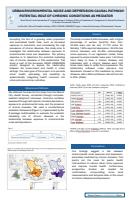
EP-016
-
Urban environmental noise and depression causal pathway: Potential roll of chronic conditions as mediator
E-Poster Details >Abstract

EP-016-
Urban environmental noise and depression causal pathway: Potential roll of chronic conditions as mediator
Presenting Author: Rebeca Ramis
Authors: Rebeca Ramis , Enrique Sanz Olea, Jesús León Hernandez, Joaquín Lozano Suarez, Verónica Briz, Saul García Dos Santos, Beatríz Nuñez Corcuera
Presenting Author: Rebeca Ramis
Authors: Rebeca Ramis , Enrique Sanz Olea, Jesús León Hernandez, Joaquín Lozano Suarez, Verónica Briz, Saul García Dos Santos, Beatríz Nuñez Corcuera
Topic:
Exposures
BACKGROUND AND AIM[|]This study falls under the URBANOME project, designed to explore the relationship between the environment and health in urban settings. Within the scope of this Project, we aim to examine the role of chronic conditions as mediator in the causal pathway linking urban environmental noise to depression.[¤]METHOD[|]We obtained the data for this study from the Madrid City Health Survey, conducted through computer-assisted telephone interviews. Outcome variables assessed through self-reports included depression, exposure to environmental noise, and the presence of chronic diseases. We used a counterfactual mediation framework, implemented by the R package multimediate, to evaluate the potential mediating role of chronic diseases in the relationship between exposure to environmental noise and depression.[¤]RESULTS[|]The study included 8,445 interviews, with a higher percentage of women (54.67%) than men. 23.29% were over 65, and 17.17% under 30. Notably, 7.82% reported depression, 39.53% had chronic diseases, and 35.43% acknowledged noise exposure. In our regression model, those exposed to environmental noise were 1.24 times more likely to have a chronic disease, and individuals with a chronic disease were 2.93 times more likely to suffer from depression. The relationship between noise exposure and depression showed a 12% mediation by chronic diseases, with a 95% confidence interval from 5% to 22%.[¤]CONCLUSIONS[|]Our findings suggest a link between environmental noise exposure and depression, potentially mediated by chronic diseases. This points out the need for public health interventions to reduce noise exposure and improve mental health. Furthermore, prospective studies are needed for confirmation, incorporating noise level measurements and temporal data on the onset of chronic diseases and depression.
Funding: H2020-SC1-BHC-29-2020 -GA:945391[¤]
